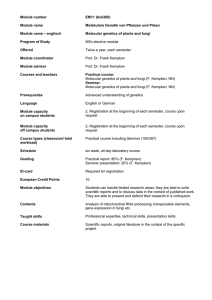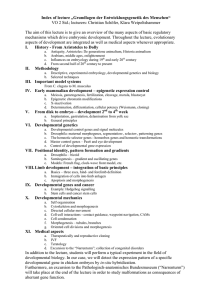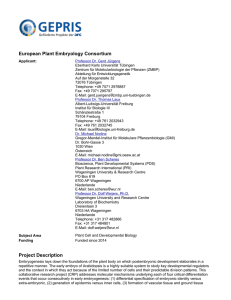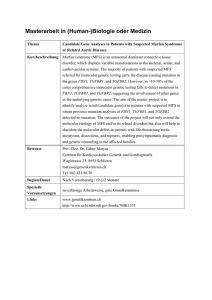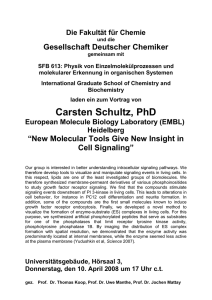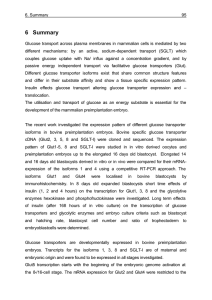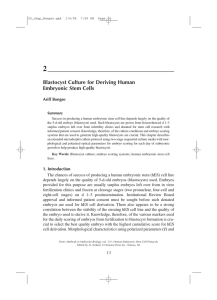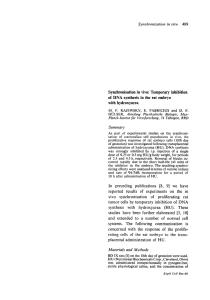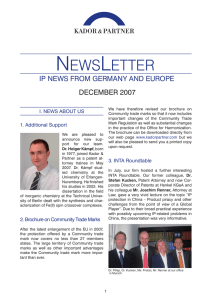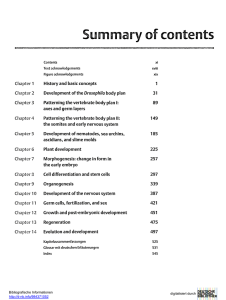Einleitende Worte
Werbung
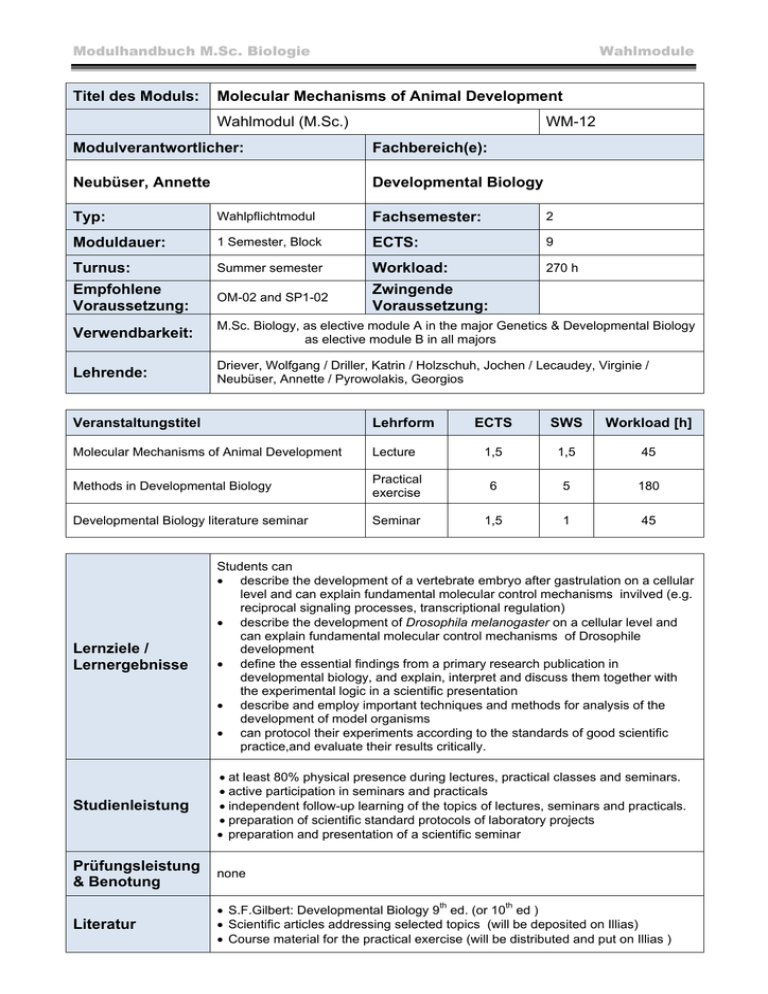
Modulhandbuch M.Sc. Biologie Titel des Moduls: Wahlmodule Molecular Mechanisms of Animal Development Wahlmodul (M.Sc.) WM-12 Modulverantwortlicher: Fachbereich(e): Neubüser, Annette Developmental Biology Typ: Wahlpflichtmodul Fachsemester: 2 Moduldauer: 1 Semester, Block ECTS: 9 Turnus: Summer semester Workload: 270 h Empfohlene Voraussetzung: OM-02 and SP1-02 Zwingende Voraussetzung: Verwendbarkeit: M.Sc. Biology, as elective module A in the major Genetics & Developmental Biology as elective module B in all majors Lehrende: Driever, Wolfgang / Driller, Katrin / Holzschuh, Jochen / Lecaudey, Virginie / Neubüser, Annette / Pyrowolakis, Georgios Veranstaltungstitel Lehrform ECTS SWS Workload [h] Molecular Mechanisms of Animal Development Lecture 1,5 1,5 45 Methods in Developmental Biology Practical exercise 6 5 180 Developmental Biology literature seminar Seminar 1,5 1 45 Lernziele / Lernergebnisse Students can describe the development of a vertebrate embryo after gastrulation on a cellular level and can explain fundamental molecular control mechanisms invilved (e.g. reciprocal signaling processes, transcriptional regulation) describe the development of Drosophila melanogaster on a cellular level and can explain fundamental molecular control mechanisms of Drosophile development define the essential findings from a primary research publication in developmental biology, and explain, interpret and discuss them together with the experimental logic in a scientific presentation describe and employ important techniques and methods for analysis of the development of model organisms can protocol their experiments according to the standards of good scientific practice,and evaluate their results critically. Studienleistung at least 80% physical presence during lectures, practical classes and seminars. active participation in seminars and practicals independent follow-up learning of the topics of lectures, seminars and practicals. preparation of scientific standard protocols of laboratory projects preparation and presentation of a scientific seminar Prüfungsleistung & Benotung none Literatur S.F.Gilbert: Developmental Biology 9th ed. (or 10th ed ) Scientific articles addressing selected topics (will be deposited on Illias) Course material for the practical exercise (will be distributed and put on Illias ) Modulhandbuch M.Sc. Biologie Wahlmodule Veranstaltungstitel: Molecular Mechanisms of Animal Development Lehrform: Lecture Modul: Wahmodul „Molecular Mechanisms of Animal Development“ Verwendbarkeit: Wahmodul „Molecular Mechanisms of Animal Development“ Modulhandbuch M.Sc. Biologie Lernziele / Lernergebnisse The students are able to describe the basic processes involved in establishing the anterior-posterior and dorsoventral axes of a Drosophila larva and explain the underlying molecular mechanisms explain the developmental origin oft he most important vertebrate organs and tissues explain the signaling pathways most relevant for embryonic development (WNT, HH, TGFbeta, FGF, Retinoic acid, Delta-Notch) and to present examples of their function during development present the „clock and wave front“ model of somitogenesis and explain on a molecular level how the oscillating activation of signaling pathways is achieved explain the development of the vertebrate limbs on a molecular level give an overview over the most important steps and mechanisms involved in the development of selected vertebrate organs structure the fundamental phases of development of the nervous system from neural induction to formation of functional neuronal connections and explain the underlying molecular mechanisms list several different mechanism of sex specification in animals and explain the mechanism of chromosomal sex specification in mammals on a molecular level describe the development of mammalian sex organs in both sexes on a mechanistic level give an overview over the main steps of vertebrate craniofacial development and explain the function of key transcription factors and signaling pathway in craniofacial development define the term “stem cell”, to list different types of stem cells with examples, and to characterize the differences between them concerning their developmental potential and origin explain the stem cell niche concept using an example of their choice explain important classical and modern techniques for the experimental analysis of embryonic development Studienleistung at least 80% physical presence independent follow-up learning of the topics of lectures using the lecture materials, text books and current scientific reviews Prüfungsleistung & Benotung none Literatur S.F.Gilbert: Developmental Biology 9. Auflage (10. Auflage): Seiten: 317-319, (270, 297, 314) 323-525 (319-531); 583-618 (591-526); lecture materials will be made available on Illias WM-12 Lehrsprache: English Teilnehmerzahl: 12 Moduldauer: 1 Semester, Block Fachsemester: 2 Angebotshäufigkeit: summer term only SWS / LVS Präsenzstudium Selbststudium Workload Summe 1,5 20 h 25 h 45 h In the lecture series the development Drosophila melanogaster is used as a paradigm to explain important molecular and cellular mechanisms (e.g. gene hierarchies, transcriptional control mechanisms, signaling pathways, morphogenes, induction etc.) involved in regulating the development of a complex multicellular organism. Subsequently, the main developmental steps in the development of a vertebrate embryo after gastrulation and the molecular mechanisms that contribute to these developmental processes will be presented. In addition, important techniques and methods for analysis of embryonic development will be covered. Inhalte Lehrmethoden und Medien Topics of the lectures: The genetics of axis specification in Drosophila: formation of the anterior posterior axis, segmentation and segment identiy, generating the dorsoventral axis (4h) Mesoderm development and differentiation after gastrulation in vertebrate model organisms, molecular regulation of somitogenesis, somite differentiation (2h) Vertebrate limb development: molecular mechanisms initiating the formation oft limbs buds, patterning along the three axes, regulation of limb outgrowth, molecular specification of limb identity (2h) Development of the left right axis in different vertebrates; Principles of organogenesis, (2h) Molecular regulation oft the development of selected vertebrate organs (2h) Sex specification, gonad and germ line development (2h) Development of the nervous system: Neural induction, neurulation, patterning, hindbrain segmentation, neurogenesis, axon guidance (2h) Neural crest and craniofacial development (2h) Stem cells, ES cell technology and cloning( 2h) Lectures using PowerPoint or Keynote presentations, development of schemes using chalk / board, discussion of concepts and open questions with the audience Handouts of lecture slides as b&w prints and as color PDFs on Illias server. Up-to-date scientific reviews for each topic provided on Illias server Wahlmodule Modulhandbuch M.Sc. Biologie Wahlmodule Veranstaltungstitel: Methods in Developmental Biology Lehrform: Practical Exercise Modul: Wahmodul „Molecular Mechanisms of Animal Development“ Verwendbarkeit: Wahmodul „Molecular Mechanisms of Animal Development“ Lehrsprache: English Teilnehmerzahl: 12 Moduldauer: 1 Semester, Block Fachsemester: 2 Angebotshäufigkeit: summer term only SWS / LVS Präsenzstudium Selbststudium Workload Summe 5 75 h 105 h 180 Lehrmethoden und Medien Lernziele / Lernergebnisse The practical classes present classical experimental embryology techniques as well as modern molecular genetics, signaling research, and microcopy techniques applied to the development of model organisms. The trained techniques include: preparation and handling of mouse and chick embryos microsurgical manipulation of embryos analysis of transgenic animal model systems organ culture transmitted light, epifluorescence and confocal microscopy gene expression analysis and antibody stainings overexpression of genes in different model organisms pharmacological manipulation of signaling pathways Instructions for practical work by faculty. Students perform experiments independently or in teams of two or small groups with support by teaching staff. Course materials and protocols will be distributed at the beginning of the class and placed on Illias. The students are able to operate transmitted light and epifluorescence microscopes and generate scientifically meaningful digital image data identify important anatomical structures in vertebrate embryos prepare mouse and chicken embryos at different developmental stages and to recognize phenotypically altered embryos explain the practical steps involved in generating combined transgenic and/or conditional mouse models through genetic crosses suggest suitable genetic crosses of genetically modified mice to address specific scientific question in Developmental Biology genotype embryos by PCR can perform simple microsurgical manipulations in chick embryos can isolate and culture organ primordial from mouse and chick embryos evaluate and apply pharmacological techniques for signaling pathway manipulation apply gene expression analysis and immunohistology to study development protocol their results according to “the standards of good scientific practice” and evaluate, also statistically, data for significance Wahlmodule Studienleistung Prüfungsleistung & Benotung none Literatur S.F.Gilbert: Developmental Biology 9th ed. (or 10th ed.) Selected scientific articles (will be placed on Illias) Written description of the experiments and methods (will be distributed at the beginning of the class and placed on Illias) WM-12 Inhalte Modulhandbuch M.Sc. Biologie at least 80% physical presence during practical classes. active participation in practical classes independent follow-up learning of the topics of classes. preparation of scientific standard protocols of laboratory projects Modulhandbuch M.Sc. Biologie Wahlmodule Veranstaltungstitel: Developmental Biology literature seminar Lehrform: Seminar Modul: Wahmodul „Molecular Mechanisms of Animal Development“ Verwendbarkeit: Wahmodul „Molecular Mechanisms of Animal Development“ WM-12 Lehrsprache: Englisch Teilnehmerzahl: 12 Moduldauer: 1 Semester, Block Fachsemester: 2 Angebotshäufigkeit: summer term only SWS / LVS Präsenzstudium Selbststudium Workload Summe 1 15 h 30 h 45 h Inhalte Each student presents a primary research scientific publication from the field of developmental neurosciences. The research paper will be discussed in the plenum by all participants of the seminar. Lehrmethoden und Medien Discussion of the independently prepared seminar presentation before and after the seminar with the supervising faculty member. Advice for improving the presentations concerning structure of the presentation, format and optical appearance of the overheads, use of scientific terms and language, rhetorical skills and body language. Students will be guided to contribute actively to the critical discussion of the publication in the plenum. Through questions of the faculty the knowledge of the students concerning the methods used in the presented study will be evaluated and unclear aspects will be explained at the black board. Lernziele / Lernergebnisse The students are able to recognize the important findings in a research publication and present them in a meaningful way using PowerPoint slides search for additional information on a scientific topic in scientific databases in libraries critically evaluate the techniques, analysis methods and conclusions of a research publication relate the findings of a primary research publication to the scientific context in this closer field of research prepare and present a well structured scientific presentation in English. know the most important experimental techniques in developmental biology and can explain when and how they are employed Studienleistung physical presence and active participation in at least 80% of the seminar classes. preparation and presentation of a scientific seminar reporting a primary research publication from the filed of developmental biology Prüfungsleistung & Benotung none Literatur S.F.Gilbert: Developmental Biology 9th ed. (or 10th ed.) Selected scientific primary publications (will be placed on Illias) Additional scientific articles identified by the students
